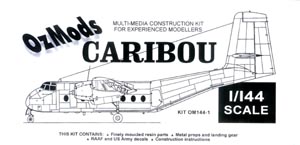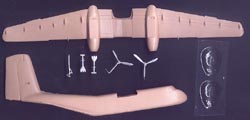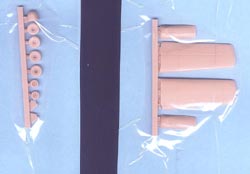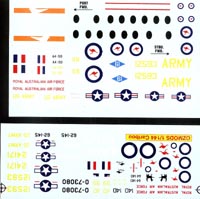OzMods 1/144 de Havilland DHC-4 Caribou
|
 |
Overview
The fourth design from de Havilland, the DHC-4 Caribou was the first
twin from the company and quite a bit larger than its earlier designs.
Created in response to a U.S. Army requirement for a tactical airlift
aircraft, the first Caribou flew on July 30, 1958. With the typical excellent
STOL capabilities familiar to de Havilland designs, the Army was impressed
with the Caribou and ordered 159 aircraft. Designated the C-7, the Caribou
saw combat operations in Vietnam, with both U.S. and Australian forces.
Other military operators included Spain, Oman, Malaysia and India.
While mainly a military aircraft, some civil usage of the Caribou occurred.
Ansett MAL operated the type in New Guinea. Other non-military operators
included Greatland Air Cargo, Air Inuit, Intermountain Aviation, and Wardair
Canada.
The Kit
 This
release from OzMods provides the only 1/144 Caribou kit that I know about.
Luckily it is an excellent kit, well cast in a brown resin. The kit features
recessed panel lines throughout, with white metal landing gear and propellers.
A small decal sheet provides markings for Australian and U.S. Army examples,
and for those ambitious souls a couple of vacuformed canopies are included. This
release from OzMods provides the only 1/144 Caribou kit that I know about.
Luckily it is an excellent kit, well cast in a brown resin. The kit features
recessed panel lines throughout, with white metal landing gear and propellers.
A small decal sheet provides markings for Australian and U.S. Army examples,
and for those ambitious souls a couple of vacuformed canopies are included.
 Construction
is very simple and straightforward, with most of the parts molded as solid
pieces. The one-piece fuselage has notches in the fin for the horizontal
stabilizer pieces, and a notch in the top for the one-piece wing. The
wing itself has the engine nacelles molded in place, as well as all the
flap hinges. The landing gear has metal struts with resin wheels, which
will help greatly in supporting the weight of what ultimately will be
a solid resin model. The packaging of the parts is very well done, with
the wing and fuselage wrapped in bubble wrap. The smaller parts are taped
to card stock, making sure they don't get broken in transit. Construction
is very simple and straightforward, with most of the parts molded as solid
pieces. The one-piece fuselage has notches in the fin for the horizontal
stabilizer pieces, and a notch in the top for the one-piece wing. The
wing itself has the engine nacelles molded in place, as well as all the
flap hinges. The landing gear has metal struts with resin wheels, which
will help greatly in supporting the weight of what ultimately will be
a solid resin model. The packaging of the parts is very well done, with
the wing and fuselage wrapped in bubble wrap. The smaller parts are taped
to card stock, making sure they don't get broken in transit.
 The
decals provide markings for both RAAF and U.S. Army Caribous, all of which
are camouflaged in one way or another. The first two RAAF options are
overall dark green, with the third option camouflaged in standard SEA
camouflage. The latter, and one of the overall dark green planes, are
from No. 35 Squadron and feature the squadron marking of an orange band
outlined in white, with a white kangaroo superimposed on top. The remaining
RAAF example dates from the late 1980s and has reduced visibility markings. The
decals provide markings for both RAAF and U.S. Army Caribous, all of which
are camouflaged in one way or another. The first two RAAF options are
overall dark green, with the third option camouflaged in standard SEA
camouflage. The latter, and one of the overall dark green planes, are
from No. 35 Squadron and feature the squadron marking of an orange band
outlined in white, with a white kangaroo superimposed on top. The remaining
RAAF example dates from the late 1980s and has reduced visibility markings.
The two U.S. Army examples date from the 1960s and are finished in overall
gloss olive drab. Both are from the 61st Aviation Company and served in
Vietnam. The first, serialed 12593, carried the name "Snake Eater
2" on the nose. The second, serialed 24171, had the name "Gizmotch"
on the nose, with a set of eyes. The decals are well printed and include
a set of cabin windows.
Conclusion
This is a wonderful kit of the Caribou, and a welcome addition to any
1/144 collection, either military or civilian. The great number of operators
throughout the world means that there are lots of great options for markings
out there. If you want to add a nice twin to your 1/144 collection, check
this kit out.
|
|
